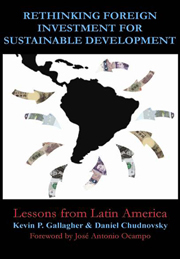Book contents
- Frontmatter
- Contents
- List of Figures
- List of Tables
- Foreword
- Acknowledgements
- Author Biographies
- Rethinking Foreign Investment for Sustainable Development
- 1 FDI and Sustainable Development in the Americas
- 2 Is Foreign Investment Always Good for Development?
- Part 1 Country Assessments
- 3 Islands of Possibility: MNCs and Economic Development in Brazil
- 4 Foreign Investment: The Polarization of the Mexican Economy
- 5 A Missed Opportunity: Foreign Investment and Sustainable Development in Argentina
- 6 Foreign Investment and Economic Development in Costa Rica: The Unrealized Potential
- Part 2 Political Economy of Natural Resources and The Environment
- Notes
- References
- Index
3 - Islands of Possibility: MNCs and Economic Development in Brazil
from Part 1 - Country Assessments
Published online by Cambridge University Press: 05 March 2012
- Frontmatter
- Contents
- List of Figures
- List of Tables
- Foreword
- Acknowledgements
- Author Biographies
- Rethinking Foreign Investment for Sustainable Development
- 1 FDI and Sustainable Development in the Americas
- 2 Is Foreign Investment Always Good for Development?
- Part 1 Country Assessments
- 3 Islands of Possibility: MNCs and Economic Development in Brazil
- 4 Foreign Investment: The Polarization of the Mexican Economy
- 5 A Missed Opportunity: Foreign Investment and Sustainable Development in Argentina
- 6 Foreign Investment and Economic Development in Costa Rica: The Unrealized Potential
- Part 2 Political Economy of Natural Resources and The Environment
- Notes
- References
- Index
Summary
Introduction
Since the 1980s, the exhaustion of Brazil's postwar economic development model became manifest in severe macroeconomic disequilibriums and the inability to maintain earlier high, sustained rates of economic growth. The stagnation of investment and weak efforts at technical innovation translated into low levels of efficiency, productivity and technological modernization.
The 1990s saw a break with the statist postwar model in favor of reduced state economic intervention and a more comprehensive liberalization of both trade and capital flows. Among the economic policies adopted to this end, trade and financial liberalization and privatization of state-owned enterprises stand out. Proponents expected these policies to eliminate bottlenecks hindering the competitiveness of Brazilian industry and to hasten the convergence of Brazil's technology, managerial practices and levels of productivity to those of the “advanced” economies.
Some scholars and policymakers saw foreign corporations as the protagonists of this process. They believed that most domestic private companies would not be able to survive or expand in a liberalizing, non-inflationary context without the subsidies they had enjoyed under the earlier model. Given the privatization process and the declining importance of state-owned companies, these analysts argued, economic modernization would be accomplished by affiliates of transnational corporations (MNCs). Under a liberalizing regime, these affiliates, mainly in the most capital and technology-intensive sectors, would have stronger incentives to invest in cost reduction and technology modernization, and to become more specialized and less vertically integrated, increasing their efficiency, productivity, and competitiveness in world markets.
- Type
- Chapter
- Information
- Rethinking Foreign Investment for Sustainable DevelopmentLessons from Latin America, pp. 33 - 50Publisher: Anthem PressPrint publication year: 2009



